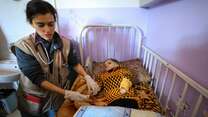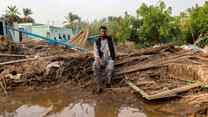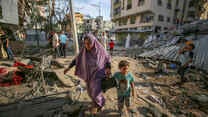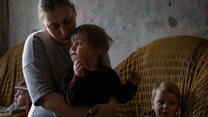In light of the ongoing humanitarian catastrophe in Gaza and the Israeli advance on Rafah, the last refuge for more than 1.5 million Palestinian civilians, the undersigned aid organisations are deeply concerned about the current and potential future suspension of funding for the United Nations Relief and Works Agency (UNRWA). The suspension of funding by donor states to the main aid provider for millions of Palestinians in Gaza and the region, at a time where famine is looming and disease outbreaks are worsening, will impact life-saving assistance for over two million civilians, half of whom are children, who rely on UNRWA aid in Gaza.
We urge the EU and Member States to take note that other aid agencies cannot replicate UNRWA’s central role in the humanitarian response in Gaza, and amidst the current crisis many will struggle to even maintain their current operations without UNRWA’s partnership and support. Considering the urgency of the situation, if the funding suspensions are not reversed, the risk of a complete collapse of the already restricted humanitarian response resulting in preventable loss of lives in Gaza becomes even more likely.
It is important to ensure a thorough investigation into the grave allegations by the Israeli authorities that 12 UNRWA employees directly participated in the attacks on October 7, and to ensure full transparency and accountability going forward. But the investigation and any subsequent accountability measures must not derail the critical, life-saving work of UNRWA in Gaza and throughout the region.
UNRWA is the largest provider of humanitarian aid in Gaza. The plain reality is that UNRWA’s humanitarian role in this crisis is indispensable – including, but not limited to provision of health and education services, food and water provision, psychosocial support, and solid waste management - and cannot remotely be replaced by any other aid organization. NGOs have made it clear that they are unable to substitute for or absorb the role of UNRWA, especially in the context of the current crisis. Furthermore, the continuing operation of UNRWA is essential to their own life-saving work. As underlined by the High Representative Josep Borrell on 4 February 2024, UNRWA is a critical lifeline for millions of Palestinians. UNRWA employs more than 13,000 staff in Gaza, of whom 158 have been killed since the fighting began. Any pause or suspension of funding also poses major problems for UNRWA’s mission and its more than 30,000 staff throughout the wider region, with the agency serving nearly six million Palestinian refugees who live within the occupied Palestinian territory and across the region. It is imperative that donors resume support to UNRWA as quickly as possible to avoid damaging the Gaza aid operation at a critical time.
Over 1 million displaced Palestinians are sheltering in UNRWA facilities across Gaza. UNRWA’s 13,000 staff in Gaza far outstrip the collective capacity of the rest of the humanitarian sector in the territory. Their role in the facilitation and delivery of life-saving humanitarian aid at scale in this crisis has been heroic. UNRWA’s supply of vital shelter, food, and basic services like sanitation, as well as the use of infrastructure by other aid organizations, is irreplaceable. UNRWA staff have faced near impossible conditions for months: in addition to the 158 UNRWA staff killed during the ongoing hostilities, at least 404 people in UNRWA shelters have been killed during the hostilities; almost 1,400 have been injured; and 155 UNRWA installations have been damaged. UNRWA workers continue to serve their community amid this unprecedented violence. The funding suspension will have wider regional implications that need to be carefully considered. In addition to Gaza, UNRWA operates in 4 other locations (West Bank- including East Jerusalem, Lebanon, Syria, Jordan) where it delivers critical services such as education and healthcare.
The undersigned NGOs urge the EU and Member States to reaffirm their support for the vital work that UNRWA and its partners do to help Palestinians survive one of the worst humanitarian catastrophes of our times. While accountability is crucial and a rigorous and credible investigation of the allegations should be supported, this can and must be achieved without further devastating Gaza’s civilian population.
- International Rescue Committee
- MdM International Network
- Handicap International - Humanity & Inclusion
- Norwegian Refugee Council
- CARE International
- Eurochild
- Plan International
- Mercy Corps
- ActionAid International
- Première Urgence Internationale
- Save the Children
- Action Against Hunger
- Oxfam
- Danish Refugee Council
- Refugees International
- War Child Alliance
- DanChurch Aid
Quotes
Marta Welander, EU Advocacy Director, International Rescue Committee:
“Any decision to pause funding for UNRWA will not just dramatically weaken the backbone of the humanitarian response for 2.2 million Palestinians in Gaza, but for the wider region as well. In total, UNRWA serves almost 6 million Palestinian refugees in Gaza, the West Bank, Jordan, Lebanon and Syria. Despite UNRWA’s vital work to save lives, its funding has been slashed in recent years. The agency is now warning that its programmes in Lebanon could cease at the end of March. Given the sheer scale of UNRWA’s work across the region, other aid agencies would not be able to fill this gap. It is imperative that the EU and its member states reaffirm their support for UNRWA’s life-saving work. If they fail to do so, more people will suffer needlessly - both in Gaza and beyond.“
Selena Victor, Senior Director, Policy & Advocacy, Mercy Corps Europe:
“Mercy Corps implores EU and its member states not to impose yet another huge barrier in responding to the overwhelming humanitarian crisis in Gaza today. The operational capacity of UNRWA in Gaza simply cannot be replicated by any other actor. Time is of the essence. Revoking funding ishurting innocent civilians in Gaza who are on the brink of starvation.”-
Morgane Rousseau, Director, Médecins du Monde Suisse:
“Defunding UNRWA will not only undermine the UN agency's capacities to save lives but also endanger the overall capacity of the humanitarian community to deliver assistance: at least 58% of INGOs operating in Gaza need support from UNRWA to conduct their own operations in the strip. Weakening UNRWA undeniably equates to condemning more people to die from diseases and starvation.”
Edouard Rodier, EU Director, NRC:
“NRC has made it very clear that UNRWA is the backbone of the aid response in Gaza, and simply cannot be replaced by any other agency. Humanitarian organisations are already overwhelmed by the unprecedented level of need, with famine looming across the strip and bombs raining down upon civilians who have nowhere safe left to flee: death and destruction are everywhere. Any decision by donor states to suspend funding to the main provider of lifesaving assistance for millions of Palestinians, who are struggling just to stay alive and protect their families from one day to the next, is not only short-sighted but deathly irresponsibly.”
Willy Bergogné, Director and EU Representative, Save the Children Europe:
“Children and families in Gaza are already grappling with enormous obstacles in accessing aid. The EU must do all in its power to ensure that no humanitarian services are disrupted while investigations are underway. Critical funding should be promptly resumed and increased in Gaza, as well as in other countries across the region where UNRWA operates. Cutting off resources for UNRWA risks the complete collapse of any semblance of a humanitarian response in Gaza.”
Niamh Nic Carthaigh, Senior EU Representative and Head of Plan International’s EU Liaison Office:
“This is a moment of reckoning for the EU as a humanitarian leader and a critical donor for this crisis. Any further cuts to UNRWA funding would be an effective death sentence for civilians trapped in Gaza and the region who rely on the agency for their survival. With a population facing starvation and two million people in need of life-saving assistance, over half of them children, ensuring UNRWA can continue providing aid is more vital than ever. So too is the need to ramp up the wider humanitarian response and ensure an immediate and permanent ceasefire. The world is watching, and bold leadership from the EU is urgently required.”



